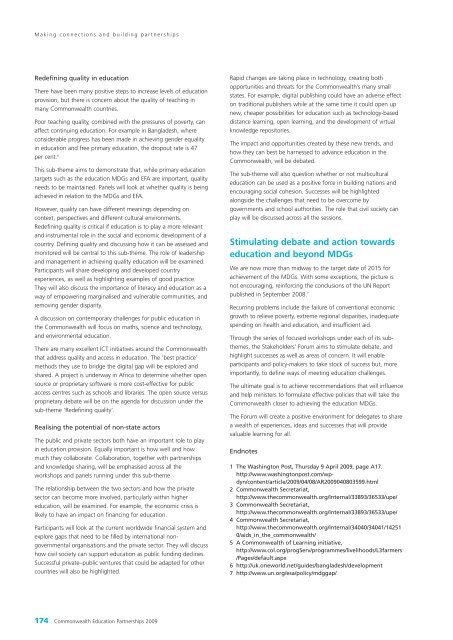Yearbook - United Nations Girls' Education Initiative
Yearbook - United Nations Girls' Education Initiative
Yearbook - United Nations Girls' Education Initiative
Create successful ePaper yourself
Turn your PDF publications into a flip-book with our unique Google optimized e-Paper software.
Making connections and building partnerships<br />
Redefining quality in education<br />
There have been many positive steps to increase levels of education<br />
provision, but there is concern about the quality of teaching in<br />
many Commonwealth countries.<br />
Poor teaching quality, combined with the pressures of poverty, can<br />
affect continuing education. For example in Bangladesh, where<br />
considerable progress has been made in achieving gender equality<br />
in education and free primary education, the dropout rate is 47<br />
per cent. 6<br />
This sub-theme aims to demonstrate that, while primary education<br />
targets such as the education MDGs and EFA are important, quality<br />
needs to be maintained. Panels will look at whether quality is being<br />
achieved in relation to the MDGs and EFA.<br />
However, quality can have different meanings depending on<br />
context, perspectives and different cultural environments.<br />
Redefining quality is critical if education is to play a more relevant<br />
and instrumental role in the social and economic development of a<br />
country. Defining quality and discussing how it can be assessed and<br />
monitored will be central to this sub-theme. The role of leadership<br />
and management in achieving quality education will be examined.<br />
Participants will share developing and developed country<br />
experiences, as well as highlighting examples of good practice.<br />
They will also discuss the importance of literacy and education as a<br />
way of empowering marginalised and vulnerable communities, and<br />
removing gender disparity.<br />
A discussion on contemporary challenges for public education in<br />
the Commonwealth will focus on maths, science and technology,<br />
and environmental education.<br />
There are many excellent ICT initiatives around the Commonwealth<br />
that address quality and access in education. The ‘best practice’<br />
methods they use to bridge the digital gap will be explored and<br />
shared. A project is underway in Africa to determine whether open<br />
source or proprietary software is more cost-effective for public<br />
access centres such as schools and libraries. The open source versus<br />
proprietary debate will be on the agenda for discussion under the<br />
sub-theme ‘Redefining quality’.<br />
Realising the potential of non-state actors<br />
The public and private sectors both have an important role to play<br />
in education provision. Equally important is how well and how<br />
much they collaborate. Collaboration, together with partnerships<br />
and knowledge sharing, will be emphasised across all the<br />
workshops and panels running under this sub-theme.<br />
The relationship between the two sectors and how the private<br />
sector can become more involved, particularly within higher<br />
education, will be examined. For example, the economic crisis is<br />
likely to have an impact on financing for education.<br />
Participants will look at the current worldwide financial system and<br />
explore gaps that need to be filled by international nongovernmental<br />
organisations and the private sector. They will discuss<br />
how civil society can support education as public funding declines.<br />
Successful private–public ventures that could be adapted for other<br />
countries will also be highlighted.<br />
Rapid changes are taking place in technology, creating both<br />
opportunities and threats for the Commonwealth’s many small<br />
states. For example, digital publishing could have an adverse effect<br />
on traditional publishers while at the same time it could open up<br />
new, cheaper possibilities for education such as technology-based<br />
distance learning, open learning, and the development of virtual<br />
knowledge repositories.<br />
The impact and opportunities created by these new trends, and<br />
how they can best be harnessed to advance education in the<br />
Commonwealth, will be debated.<br />
The sub-theme will also question whether or not multicultural<br />
education can be used as a positive force in building nations and<br />
encouraging social cohesion. Successes will be highlighted<br />
alongside the challenges that need to be overcome by<br />
governments and school authorities. The role that civil society can<br />
play will be discussed across all the sessions.<br />
Stimulating debate and action towards<br />
education and beyond MDGs<br />
We are now more than midway to the target date of 2015 for<br />
achievement of the MDGs. With some exceptions, the picture is<br />
not encouraging, reinforcing the conclusions of the UN Report<br />
published in September 2008. 7<br />
Recurring problems include the failure of conventional economic<br />
growth to relieve poverty, extreme regional disparities, inadequate<br />
spending on health and education, and insufficient aid.<br />
Through the series of focused workshops under each of its subthemes,<br />
the Stakeholders’ Forum aims to stimulate debate, and<br />
highlight successes as well as areas of concern. It will enable<br />
participants and policy-makers to take stock of success but, more<br />
importantly, to define ways of meeting education challenges.<br />
The ultimate goal is to achieve recommendations that will influence<br />
and help ministers to formulate effective policies that will take the<br />
Commonwealth closer to achieving the education MDGs.<br />
The Forum will create a positive environment for delegates to share<br />
a wealth of experiences, ideas and successes that will provide<br />
valuable learning for all.<br />
Endnotes<br />
1 The Washington Post, Thursday 9 April 2009, page A17.<br />
http://www.washingtonpost.com/wpdyn/content/article/2009/04/08/AR2009040803599.html<br />
2 Commonwealth Secretariat,<br />
http://www.thecommonwealth.org/Internal/33893/36533/upe/<br />
3 Commonwealth Secretariat,<br />
http://www.thecommonwealth.org/Internal/33893/36533/upe/<br />
4 Commonwealth Secretariat,<br />
http://www.thecommonwealth.org/Internal/34040/34041/14251<br />
0/aids_in_the_commonwealth/<br />
5 A Commonwealth of Learning initiative,<br />
http://www.col.org/progServ/programmes/livelihoods/L3farmers<br />
/Pages/default.aspx<br />
6 http://uk.oneworld.net/guides/bangladesh/development<br />
7 http://www.un.org/esa/policy/mdggap/<br />
174 Commonwealth <strong>Education</strong> Partnerships 2009
















